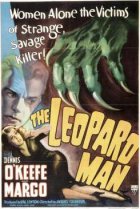
The Leopard Man Page #8
- APPROVED
- Year:
- 1943
- 66 min
- 467 Views
KIKI:
(she rises)
Well, I'm next. You won't hear
anything like that, Mr. Galbraith.
(gesturing toward
applause)
I'm not a popular favorite since I
let the leopard loose.
GALBRAITH:
(with heavy gallantry)
I'm sure if you are as talented as
you are charming, Miss Walker, you
have nothing to worry about.
KIKI:
(moving off)
Thanks.
Galbraith starts to knock out his pipe on the heel of his
hand.
GALBRAITH:
Well, I'd best be off.
JERRY:
(putting a restraining
hand on his forearm)
I want to ask you something.
Galbraith looks at him questioningly.
JERRY:
It's about the leopard.
GALBRAITH:
You're worrying about its killing
someone else?
JERRY:
Yes. I want to go out and patrol
the town - be everywhere at once -
be sure nothing happens to anybody.
GALBRAITH:
Of course. It's the way any decent
man would feel in your position.
JERRY:
You know about animals -- their
habits -- will it come back?
GALBRAITH:
No. I'm quite sure.
Jerry gives a little sigh of relief.
GALBRAITH:
There is no danger at all. It's a
wild animal. Do you think a wild
animal prefers walls, streets and
people when it can get into open
country?
JERRY:
(terribly anxious to be
convinced)
That's right, of course.
GALBRAITH:
(starting toward the
steps)
Don't feel so concerned, Jerry.
As they descend the stops together, the CAMERA HAVING PANNED
LEFT to stay with them, now DOLLIES BEFORE them as they go
down the path, toward the fountain. They come abreast of the
fountain and Galbraith pauses a moment.
GALBRAITH:
I've seen a bit of life, and I have
learned one thing. We are like that
ball dancing on the fountain. We
know as little about the forces
that move us and move the world
around us as that empty ball, which
lives only because the water pushes
it into the air, lets it fall and
catches it again. You shouldn't
feel too badly about Teresa
Delgado.
CLOSE SHOT - the fountain. We see the ball rising and falling
� oscillating in its movement.
Clo-Clo is dancing, and although we can not see her, we can
hear the click of her castanets, the quick, hard tread of her
feet. We catch an occasional glimpse of her shadow, as she
passes in dancing on the other side of the fountain.
DISSOLVE:
INT EL PUEBLO CAFE - EARLY MORNING
CLOSE SHOT of the fountain. The jet of water has been turned
off and the ball floats quietly on the surface of the
innermost basin.
MED. LONG SHOT of Clo-Clo, as she makes her way to the gate.
She is dressed in street clothes. Bus boys are busy piling
chairs onto the tables while two young maids are hosing down
the tiles. Cigarette butts, bits of paper and ether odds and
ends of the night's trade litter the cafe and go swishing
ahead of the streams of water.
Clo-Clo smiles to one of the young maids as she passes.
CLO-CLO
A long night, Chiquita.
MAID:
(straightening up and
shutting down the hose
with her thumb)
How long can a night be, Clo-Clo,
when you spend it dancing?
CLO-CLO
(passing by)
Twice as long as a day with your
mop and pail.
The girl laughs and lets the water of the hose spray out
again. Clo-Clo goes on, out of the gate.
DISSOLVE:
EXT. THE STREET - EARLY MORNING
TRUCKING SHOT of Clo-Clo as she walks wearily down the
deserted street. She is smoking a cigarette.
Swinging from one hand is the little ornamented chamois bag
in which she keeps her castanets. She comes to the flower
store, sees that it is open and, throwing her cigarette away,
starts in.
INT FLOWER STORE - EARLY MORNING
MED. SHOT - Rosita, Senora Contreras' maid, has selected a
bouquet of long stemmed roses from a large tin bucket. As she
holds them aloft the flower vender, a chubby good-natured
little Mexican in his late fifties, gently wraps a piece of
newspaper around the wet stems.
FLOWER VENDOR:
(indicating the stems)
Roses are like children -� some
have short legs and some long.
The flower vendor laughs loudly, his body vibrating. Rosita
sees no humor in this remark and taking a coin from her
pocket, hands it to him. Still chuckling, the vendor moves to
his cash drawer, to make change. In the b.g., Clo-Clo can be
seen entering the store. She tiptoes forward directly behind
the flower vendor and ignoring Rosita completely, snatches a
wilted gardenia from a tin. The flower vendor has caught this
action in the mirror and whirling, pulls the gardenia out of
her hand,and at the same time turns back to the cash drawer.
Clo�Clo isn't at all abashed by the vendor's action.
CLO-CLO
You can't sell it - it's a day old.
VENDOR:
But my stomach isn't a day old. If
I don't sell flowers -- I don't eat
-� and I love to eat.
Clo-Clo tries a new approach. Coyly she winks at him.
CLO-CLO
I'll tell everybody you gave it to
me, -- that will be good for your
business.
VENDOR:
Yes, -- but bad for my wife.
The vendor drops the change into Rosita's hand, then turning
on Clo-Clo, shoes her off with a motion.
ANOTHER ANGLE � taking in Rosita at edge of stall. She looks
off at Clo-Clo and with a grand gesture, pulls a long stemmed
rose from the bouquet.
ROSITA:
My mistress, Consuelo Contreras,
does not have to beg for flowers.
She won't miss one.
Rosita flings a rose to Clo-Clo. Clo-Clo catches it. With a
snap she breaks the stem and thrusts the rose into her hair.
CLO-CLO
(impudently)
Thank the Senorita for me.
EXT STREET - EARLY MORNING
MED. LONG SHOT. The CAMERA PANS WITH Rosita as she hurriedly
crosses the street and mounting the opposite sidewalk, enters
the Contreras' home.
INT. ENTRANCE HALL CONTRERAS' HOME - EARLY MORNING
It is a cool, shadowy square room. At the back is a stairway.
The floor is tiled. Through an arched grilled doorway, we can
see the living room beyond. The front door opens and Rosita
steps in hurriedly, her heels clicking on the tile floor.
Three people are standing waiting. They are Senora Contreras,
Cousin Felipe and Marta, an old servant who is more companion
than maid in the household by this time. Marta is dressed all
in black -� dress, shoes and apron. Her grey hair is dragged
back to a knot. She wears tiny gold loops in her pierced ears
and a gold cross at the fastening of her high collar. Senora
Contreras, a dignified, imposing woman with the remnants of
great beauty still apparent in her expressive eyes and lovely
hair, is dressed in a flowing lacy negligee. In her arms she
carries a little Chihuahua dog. Cousin Felipe is a dapper
little cat of a man, meticulously dressed in the proper
apparel of thirty years ago. The Senora and Cousin Felipe are
waiting on the stairs. Marta is in the hail.
MARTA:
(crossly)
Shhh!
SENORA CONTRERAS
(softening the rebuke,
whispering)
It will spoil the birthday song,
Rosita, if we wake her too soon.
Translation
Translate and read this script in other languages:
Select another language:
- - Select -
- 简体中文 (Chinese - Simplified)
- 繁體中文 (Chinese - Traditional)
- Español (Spanish)
- Esperanto (Esperanto)
- 日本語 (Japanese)
- Português (Portuguese)
- Deutsch (German)
- العربية (Arabic)
- Français (French)
- Русский (Russian)
- ಕನ್ನಡ (Kannada)
- 한국어 (Korean)
- עברית (Hebrew)
- Gaeilge (Irish)
- Українська (Ukrainian)
- اردو (Urdu)
- Magyar (Hungarian)
- मानक हिन्दी (Hindi)
- Indonesia (Indonesian)
- Italiano (Italian)
- தமிழ் (Tamil)
- Türkçe (Turkish)
- తెలుగు (Telugu)
- ภาษาไทย (Thai)
- Tiếng Việt (Vietnamese)
- Čeština (Czech)
- Polski (Polish)
- Bahasa Indonesia (Indonesian)
- Românește (Romanian)
- Nederlands (Dutch)
- Ελληνικά (Greek)
- Latinum (Latin)
- Svenska (Swedish)
- Dansk (Danish)
- Suomi (Finnish)
- فارسی (Persian)
- ייִדיש (Yiddish)
- հայերեն (Armenian)
- Norsk (Norwegian)
- English (English)
Citation
Use the citation below to add this screenplay to your bibliography:
Style:MLAChicagoAPA
"The Leopard Man" Scripts.com. STANDS4 LLC, 2025. Web. 3 Mar. 2025. <https://www.scripts.com/script/the_leopard_man_896>.







Discuss this script with the community:
Report Comment
We're doing our best to make sure our content is useful, accurate and safe.
If by any chance you spot an inappropriate comment while navigating through our website please use this form to let us know, and we'll take care of it shortly.
Attachment
You need to be logged in to favorite.
Log In